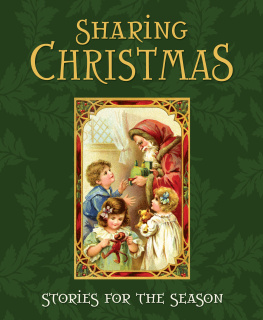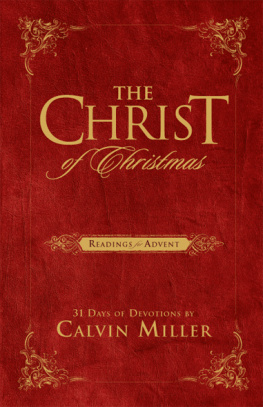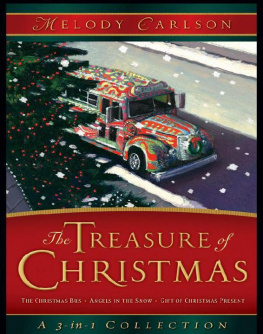Finding
Christmas
Finding
Christmas
Stories of Startling Joy
and Perfect Peace
James Calvin Schaap

2005 by James Calvin Schaap
Published by Revell
a division of Baker Publishing Group
P.O. Box 6287, Grand Rapids, MI 49516-6287
www.revellbooks.com
Previously published under the title Startling Joy
Ebook edition created 2010
Ebook corrections 04.18.2016 (VBN)
All rights reserved. No part of this publication may be reproduced,
stored in a retrieval system, or transmitted in any form or by any
meansfor example, electronic, photocopy, recordingwithout the
prior written permission of the publisher. The only exception is brief
quotations in printed reviews.
Library of Congress Cataloging-in-Publication Data
Schaap, James C., 1948
Finding Christmas : stories of startling joy and perfect peace
/ James Calvin Schaap.
p. cm.
Originally published: Startling joy. c2005.
ISBN 0-8007-1939-5 (cloth)
1. Christmas stories, American. I. Title.
PS3569.C33S73 2009
813p.54dc22 2009016180
Contents
Youve Been Searching
for Joy...
Who hasnt? Its Christmas. So wheres the goodwill? Wheres the love? Would you recognize them if you saw them? Maybe you ought to Prepare for the Unexpected (page 7). Or unravel Christmas joy as in The Mystery (page 11). Someone says you can get a glimpse in the face of The Baby (page 19) at the local nativity. But youre not sure youll make it. Theres TheParty (page 31). And there are presents to buy. Finding just the right ones takes time, sometimes a lifetime, says that mom who knows all about The Gifts (page 57). Maybe if you look at The Church (page 85). Surely theres joy there. Remember that time you saw it in the faces of the children at The Pageant (page 99). How wonderful that is, like The Afterglow (page 113) when all those you love and enjoy most have been round you. What if you could find that joy all over again? What if joy like that would descend, covering you and everyone you know like The Snowfall (page 141)what then? What then? Wouldnt it change everything?
Prepare for the Unexpected
A Foreword
Most of the stories in this book end at beginnings. The last story ends with the last prayer of the Bible, one of the best beginnings an ending ever had: Come, Lord Jesus.
What better beginning than the coming of the Christ? Into our lives, into the world, his second coming ever fulfilling his first?
The character who prays that final prayer has just begun to know a personal, spiritual poverty which knowledge is the perfect preparation for Jesus.
Another character, a young girl standing outside the church at the end of her story, for the first time recognizes the baby Jesus in her arms, recognizes the Christ in the greater story of Christmas.
Another character, a grown woman, by watching the moment a new mother first meets her adopted baby, is persuaded to remember her own motherhood, and so begins grandmotherhood in hope and love.
And a grandmothers story ends just as her granddaughter says, for the first time ever, to the swelling of the old womans heart: I want to see Jesus.
There is a pattern here.
Jim Schaap writes about those common relationships that all of us have experienced. He knows our lives, re-fires our memories. He draws us into settings familiar. He causes us to inhabit the worlds of plain folk struggling with the problems of an ordinary life and he makes it all so very, very important, for this is the place where humanity happens. We love and fail and work and hurt and grow here. And as all these stories revolve around Christmas and the incarnation, here too is where God comes to meet us, at which we make our best beginnings.
That is part of the pattern too. More than making them merely important, Schaap writes sacred mystery into our common lives. Every one of his stories brings us, his willing readers, to a holy anagnorisis
This Greek word generally means recognition. Aristotle used it to describe that moment in a tragedy when some startling discovery by a character produces a change from ignorance to knowledgeand knowledge reverses the characters life thereafter. In tragedy, that reversal is for the worst. Near the end of his play, Oedipus the king discovers to his horror that the woman he married is in fact the woman who bore him long ago. He has married his mother.
In Schaaps stories the anagnorisis, the recognition, is ever and altogether the opposite. Lives leap toward their beginnings. Characters caught in struggles that bid fair to bury them (our grandmother, just minutes before her granddaughter wanted to see Jesus, had wished that she were with Jack [her deceased husband] and the Lord); characters in various forms of troubled ignorance; characters grown helpless all suddenly discover, by means most ordinary and familiar, that Jesus... hes always there.
Perhaps a better word than anagnorisis is epiphany. James Joyce used it to describe certain recognitions in his stories; but his epiphanies often disabused a character of some illusion. They showed reality to be a hard, impenetrable, unforthcoming thing.
Jim Schaap, however, uses this word in his very last story as it has been used by the Christian Church from its beginning: to describe the startling discovery that Christ can shine in the common things. The Lord of glory flashes forth! And reality grows sacred, the handiwork of God, the stuff that contained the Word, the Son of God.
Ill quote Schaap: And thats when it hit me, this epiphany of Christmas. He came for those who need him, not because they are poor or slovenly or unable to care for themselves. He came for... some like me, self-satisfied with... arrogance. He came for me because I tooin my annoyance and my prideam very much among the needy.
And then: The Lord of heaven and earth was acting upon me. Come, Lord Jesus.
So ends the book, with the beginnings of a startling, everlasting joy.
Walter Wangerin Jr.
March 2005
The Mystery
A Preface
Its so cold outside that the bus windows are sealed in frost, and I dont see this monstrosity of a bus driver until the very second the doors swish open and she yelps at me to watch my step on the way up.
My daughters laid up right now in pain something fierce with a strained ligament, she says, and I wouldnt bless something like that on my worst enemy.
Shes so huge that her bulk hangs from the edge of the drivers seat the way a blanket of melting snow leans over a roof on a sunny day. Her legs have been poured into a pair of fancy black Levis; the seams have been nailed shut, fortunately, by a line of brass rivets that run up from her boots to her waist. Her shirt is embroidered with squiggles and sequins down her forearms, her cuffs have mother-of-pearl snaps, and shes left her wide collar slanting open halfway to her navel, as if someone should care.
The bus is nearly full. I take a seat up front, one of the only ones left. Ive been in her presence for all of ten seconds, but Ive no trouble knowing why thats the only seat left: everyone else has taken cover.
She was only stepping off a curb is all, the driver says, and something went ping in her leg. Just like that, she went down.
Im thinking that this is a university shuttle bus Ive just boarded, and one is not supposed to find these types on university buses, where meditative silence reigns. Her jabber is an affront, an embarrassment, especially since its aimed right at me. Her voice ricochets into the far reaches of the vehicle, and I pull out the latest campus paper, open it wide to cover my eyes.
Next page











